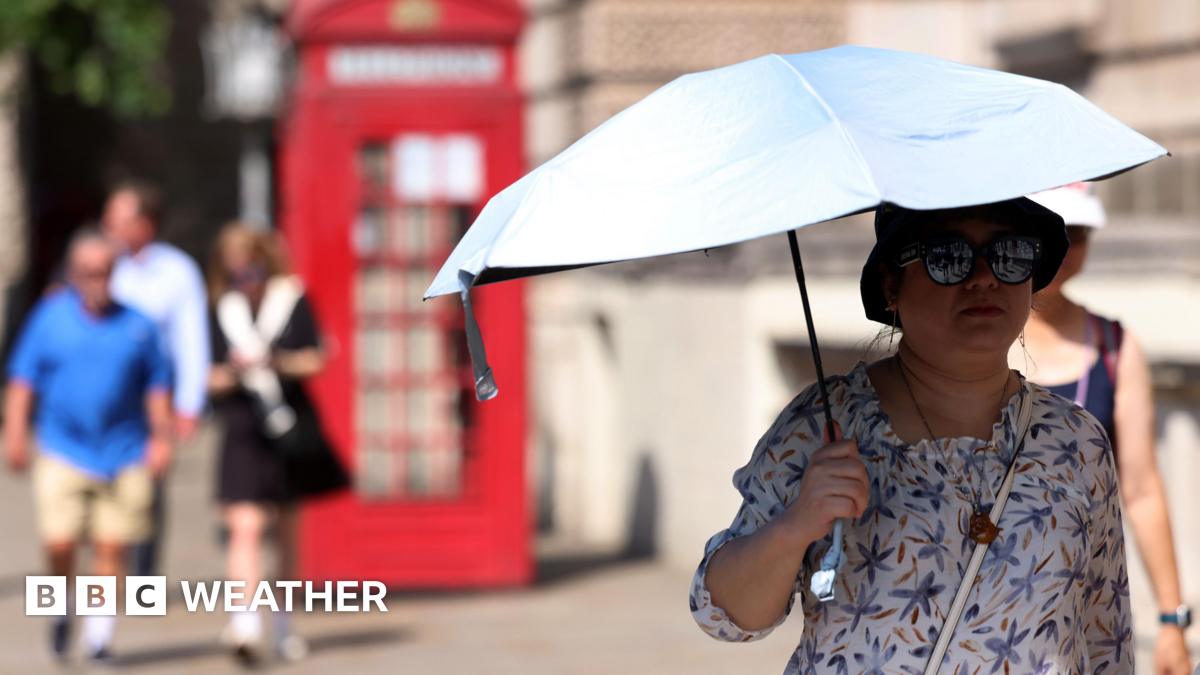Has the British summer changed beyond recognition?
- BBC News
Heatwaves, hosepipe bans, flooding rain - and Storm Floris - this summer has had it all.
But amidst that variety of weather one theme stands out - it has been very warm.
The UKs second-warmest June on record was followed by its fifth-hottest July and an August that provided more heat, after a stormy start.
British summers have a reputation for being mixed - or even "rubbish" - but does climate change mean it is time to alter our perceptions and accept that our summers have changed beyond all recognition?
There is no doubt that our summers are changing due to human-induced global warming.
Eight of the last 10 summers (2015-2024) have seen temperatures above the long-term average.
The Met Offices State of the UK Climate report, external finds that the number of days with temperatures above 30C (86F) has more than trebled in the most recent decade compared with the 1961-1990 average.
These trends are set to continue, according to Professor Liz Bentley, Chief Executive of the Royal Meteorological Society.
She says: "In future our summers will become hotter and drier – so temperatures will continue to increase, and we are likely to see a decrease in rainfall over the summer months."
Professor Bentley adds that heatwaves will become more frequent, intense and extreme with "record breaking temperatures endured both during the day and night".
For those dreaming of lazy sunny days on beaches or in beer gardens, the prospect of hotter summers might sound appealing.
But some of the impacts will be much less palatable - with more frequent droughts and wildfires.
This could hinder efforts to tackle climate change by reducing the amount of carbon that can be absorbed by plants in the spring and summer.
Professor Jadu Dash from the University of Southampton explains: "Drought reduces the ability of ecosystems to sequester carbon, leading to a net decrease in carbon capture during this critical period.
"The frequency and intensity of fires are projected to rise, which would not only reduce vegetation cover but also release substantial amounts of stored carbon into the atmosphere."
Wildfires damaged homes in Wennington, east London, in the extreme heatwave of July 2022
Hotter summers threaten significant health impacts, with mortality rates increasing when temperatures rise above 27C (81F).
Infrastructure will also suffer, with much of it having been built with a cooler climate in mind.
As Professor Liz Bentley puts it, "our houses, schools, hospitals and care homes have been built to keep us warm, not cool. Our roads start to melt in the heat and rail tracks buckle leading to travel disruption."
One of the key ways meteorologists judge and compare summers is against the long-term average, measured over a 30 year period - currently 1991-2020.
For instance, June 2025 brought temperatures 1.9C (3.4F) above average, while July was 1.5C (2.7F) warmer than normal.
These averages are recalculated every 10 years to take account of our changing climate but, with the world warming so quickly, there is a risk that even this might not be keeping pace with reality.
Met Office Senior Scientist Michael Kendon says long-term averages can only truly represent our current climate if it is stationary.
However he adds that the UK climate is changing fast so that "even a comparatively recent period like 1991-2020 no longer reflects our current climate".
Despite this, averages remain a useful tool to show just how much things are changing.
With summers getting warmer and drier, you might imagine that the most British of pastimes - complaining about rain - could be under threat.
But it is not that simple as when downpours do occur, the extra heat in the atmosphere means they are likely to be more intense.
Our changing climate might be changing our expectations too, according the Met Offices socio-meteorologist Helen Roberts.
"As humans, weve always had a biased expectation of what summer will bring. We have selective memories. We hold on to memories that are more positive and more interesting, for example warm sunny days outside.
"As our climate warms and we see more hot weather we will perceive it as less extreme – and come to expect more."
So, any summer showers may bring even more disappointment.
A sunny afternoon at the beach may be more memorable than a rainy day indoors
When it comes to heatwaves, Helen says our memories can disproportionately focus on the upsides, quickly forgetting how uncomfortable heat can be.
"While hot weather is occurring, people will say that it is difficult or draining but very soon after the event they will focus on more positive memories."
While there is no doubt our summers have changed, you may well argue that they have not yet shifted beyond recognition.
However, changes look set to accelerate in the coming decades.
According to the Met Office, external, the hottest summer days in 2070 will be 4-7C (7-13F) warmer than they were in 1990.
In the south of the UK, having two days in a row when temperatures get above 30C (86F) will be 16 times more likely.
By the start of the next century in 2100, highs of 40C (104F) - only recorded once before, in 2022 - could be commonplace, happening every three or four years.
At the same time, more intense summer downpours will lead to the risk of flash flooding.
The challenge for government, local authorities, health services, and all of us, will be in adapting to the many changes that lie ahead as the world continues to warm.